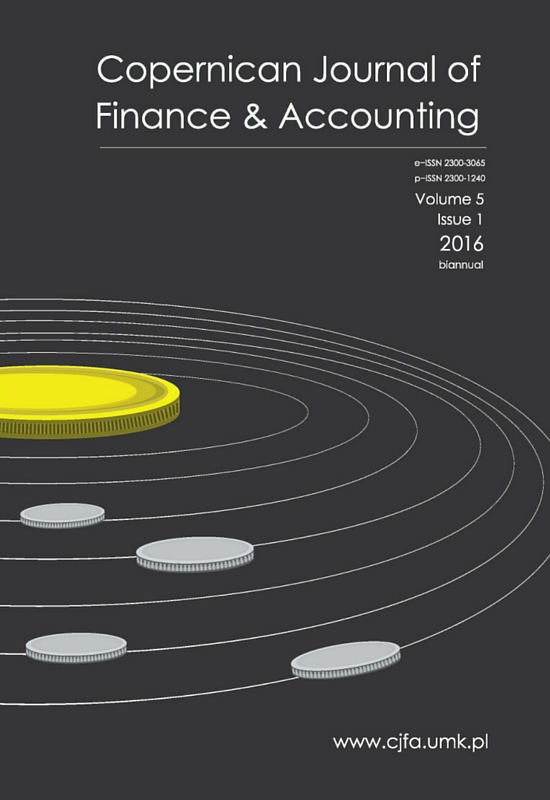Accountancy-Based Sources of Information for Planning Purposes in SMEs
DOI:
https://doi.org/10.12775/CJFA.2016.010Ključne riječi
SMEs, Business Planning, Accountancy-Based Sources of InformationSažetak
The present paper’s research objective is to reveal the specifics and capabilities of the accountancy to serve as an information base for planning of the business of SMEs. In this regard, a research method (a survey) focusing on study of documentation in a number of Bulgarian SMEs has been carried out. Based on the results gained after the implementation of the research method, main sources of information for planning purposes in SMEs have been synthesized and evaluated. The main conclusions are that due to relatively high level of quality, actuality and availability, the accountancy-based data can constitute a major source of information for planning purposes in SMEs.
References
Bramford, C., & Bruton, G. (2006). A framework for success: Small business management. United States of America: Thomson South-Western.
Ciemleja, G., & Lāce, N. (2009). SME Performance Management Using Life Cycle Stage Concept. In: Мировая экономика и бизнес-администрирование: 5-я международная научно-практическая конференция, Belarus, Minsk, 28-30 May, 2009. Minsk: BNTU, 119-127.
Drury, C. (2005). Management and cost accounting. 6th ed. London: Thomson South- Western.
Dziawgo, L. (2014). Greening financial market. Copernican Journal of Finance & Accounting 3 (2), 9-23. http://dx.doi.org/10.12775/CJFA.2014.014.
Germanos, G, Pliota, T., & Germanou, E. (2013). A qualitative approach of strategy formulation of Greek Small-Medium (SME) companies in times of crisis from an accounting perspective. In: Proceedings of the 3rd International Conference: Quantitative and Qualitative Methodologies in the Economic & Administrative Sciences, Greece, Athens, 23-24 May, 2013, 192-202.
Kocmanová, A., & Simberova, I. (2014). Determination of environmental, social and corporate governance indicators: framework in the measurement of sustainable performance. Journal of Business Economics and Management 15 (5).
Papazov, E. (2014). A “Reverse” Approach to Coordination of Strategic and Tactical Financial Decisions for Small Business Growth. Procedia - Social and Behavioural Sciences, 156, 161–165.
Papazov, E., & Mihaylova, L. (2010). Information provision for strategic planning in Bulgarian SMEs. Review of international comparative management, 11 (4), 575-581.
Papazov, E., & Mihaylova, L. (2014). Linking Accounting Information with Business Planning in Bulgarian SMEs. Paper presented at the 8th International Management Conference: Management challenges for sustainable development. Bucharest, Romania, 321-327.
Peršić, M., Bakija, K., & Vlašić, D. (2015). Framework for improving quality and comparability of non-financial reporting system. Copernican Journal of Finance & Accounting 4 (2), 109-127. http://dx.doi.org/10.12775/CJFA.2015.019.
Pyka, I. (2015). Balance sheet policy of central banks in the conditions of the exit strategy of central banks. Journal of Economics and Management – University of Economics in Katowice 21 (3), 110-127.
Raulinajtys-Grzybek, M., & Świderska, G. (2014). Object-based costing as an important tool for the economic analysis of sustainable development. Copernican Journal of Finance & Accounting 3 (1), 135-144.
Simeonov, O., & Lambovska, M. (2012). A suggestion about potentialities for the SWOT analysis’s development concerning threats. Ekonomika a management / E+M Economics & Management, (2), 94-103.
Todorov, K., Kolarov, K., & Ruychev, S. (2002). Rykovodstvo za startirane na sobstven biznes v sferata na uslugite, Sofia, Bulgaria, 108-110 (in Bulgarian).
Downloads
Objavljeno
How to Cite
Broj časopisa
Rubrika
Stats
Number of views and downloads: 534
Number of citations: 0



